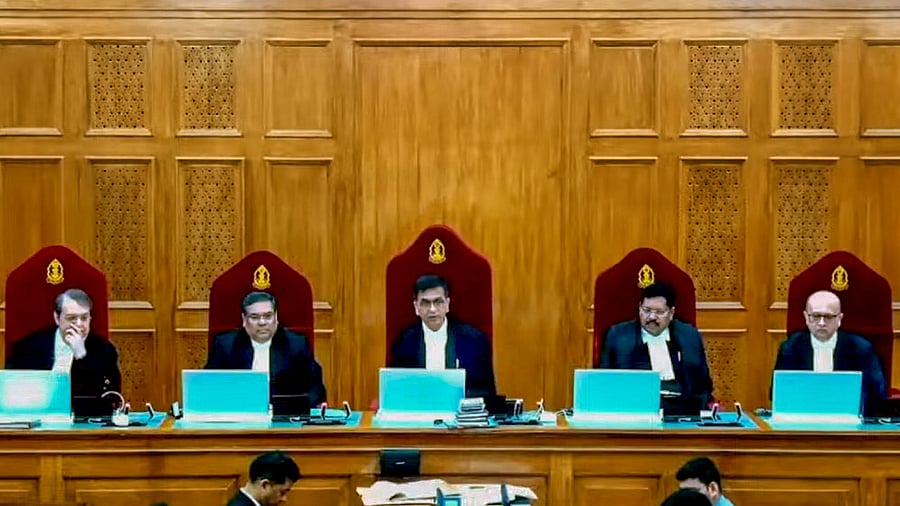
The five-judge bench headed by Chief Justice of India Dr D.Y. Chandrachud and comprising Justices Sanjiv Khanna, B.R. Gavai, J.B. Pardiwala and Manoj Mishra during pronouncement of verdict on electoral bond scheme on Thursday.
Credit: PTI Photo
New Delhi: The Supreme Court on Thursday said the voters right to access information can't be curtailed on the pretext of privacy and the desire to check the flow to unaccounted money to the political parties, as the right to know is paramount for free and fair elections and democracy.
Justice Sanjiv Khanna, a part of the five-judge bench, rejected the Union government's argument in defence of Electoral Bonds Scheme that the donor may like to keep his identity anonymous, holding it is a mere ipse dixit assumption.
"The plea of infringement of the right to privacy has no application at all if the donor makes the contribution, that too through a banking channel, to a political party. It is the transaction between the donor and the third person," he said.
Under the Scheme, Justice Khanna noted the political parties in power may have asymmetric access to information with the authorised bank. They also retain the ability to use their power and authority of investigation to compel the revelation of Bond related information. "Thus, the entire objective of the scheme is contradictory and inconsistent," he said.
"The scheme falls foul and negates and overwhelmingly disavows and annuls the voters right in an electoral process as neither the right of privacy nor the purpose of incentivising donations to political parties through banking channels, justify the infringement of the right to voters," he wrote.
Justice Khanna said while secret ballots are integral to fostering free and fair elections, transparency—not secrecy—in funding of political parties is a prerequisite for free and fair elections. The confidentiality of the voting booth does not extend to the anonymity in contributions to political parties, he said.
"While quid pro quo and clientelistic corruption erodes quality and integrity of government decision making, the power of money may also pose threat to the electoral process itself," Justice Khanna said.
He also said when money is exchanged as quid pro quo then the line between persuasion and corruption gets blurred.
The bench also pointed out the right to vote is a constitutional and statutory right, grounded in Article 19(1)(a) of the Constitution, as the casting of a vote amounts to expression of an opinion by the voter.
"The citizens’ right to know stems from this very right, as meaningfully exercising choice by voting requires information. Representatives elected as a result of the votes cast in their favour, enact new, and amend existing laws, and when in power, take policy decisions. Access to information which can materially shape the citizens’ choice is necessary for them to have a say in how their lives are affected," he said.
Dealing with the claim of privacy by a corporate or a company, Justice Khanna said it will be rather difficult for a public (or even a private) limited company to claim a violation of privacy as its affairs have to be open to the shareholders and the public, which would be equally, with some deference, apply to private limited companies, partnerships and sole proprietorships.
